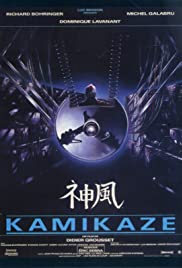
KAMIKAZE
France, 1986, 89 minutes, Colour.
Richard Bohringer, Michel Galabru, Romane Bohringer.
Directed by Didier Grousset.
Kamikaze is a blend of futuristic thriller with a spoof of the media world, especially that of television. It was produced by Luc Besson, who wrote the screenplay with his former assistant director Didier Grousset, who directs. It is in line with some of the Besson's earlier films including The Last Combat and Subway.
The film has a strong cast with Richard Bohringer (The Balance, The Cook, the Thief, His Wife and Her Lover) and Michel Galabru (La Cage au Folles, as the father).
The film recreates the world of the television studios, contrasting it with the world of the isolated and ageing computer expert who has been sacked. In his room, he constructs a machine which can fire back at the television waves coming through his set and assassinate live presenters. The government is involved, the police are involved - and there is a confrontation with the kamikaze firing his machine at popular television.
Of interest, Bohringer's daughter Romane plays his daughter in the film.
1. Interesting and entertaining thriller, satire on the world of television and audiences?
2. Production values: wide screen photography, the television studios, the contrast with Albert's room and his house? The stunt work, special effects for the assassinations? The musical score, the songs?
3. The title, the dressing up of Albert as a kamikaze for the finale? The media calling him a kamikaze? A pilot in his own room, death squad, willing to die himself?
4. The portrait of Albert: his age, as an electronics wizard, the computer corporation and its workshops? Long years of work? His anger, depression? His relationship with his niece Lea and Patrick? His watching of television, the self-pity? His growing aggression? The construction of the weapon? Sitting in his armchair, firing the weapon at the live studio personality? The murders? At home, his continued killings? Angry when they put videotape images and he cannot kill? The challenge to him? The politician and her live broadcast, his reaction, attention, her speaking to him alone? Romain and his taunting Albert? His firing? The interruption by Lea and her realisation of the truth? His callously shooting her? Patrick and his investigations, the recoil from the return charge and his falling to his death? Albert placing their bodies as if they had killed each other? The confrontation with Romain, his wanting to leave, the hole in the roof, the discovery of the machine? The political police coming in and assassinating Albert? Albert as symbolising the ageing, the redundant, the unemployed, the television audience? The assault on them and his assault on TV? His dressing up as the kamikaze?
5. Romain, his work as a policeman? The government's communications office, Laure and her supervision? The difficulty of finding the truth, the announcement that the deaths were from natural causes? The further killings? Romain looking at the tapes, his working out what had happened? His being removed from the case? His return to the case, his getting the electronic brains together, the counter-weapon, the trap, Laure and her performance, his intervention? His going to visit Albert, the many suspects, his interaction with Albert, finding the machine? The secret agents and their killing Albert? Taking the evidence - his return to ordinary duties?
6. Laure, the government, supervision of the police? Her personality, style? Control? Her interactions with Romain? Her going on the television, the description of the person who would most attract and taunt Albert?
7. The portrait of the television studios and electronics workshops? The workers, their skills, inventions? Constructing the guns? Firing?
8. Lea and Patrick, their ordinary life, welcoming their uncle? His meals with them, his moroseness? The fancy dress party, as the kamikaze? Lea's realisation of the truth, her brutal murder? Patrick's accidental death?
9. Romain and his daughter, the scenes at home - the contrast with the investigation and the world of television?
10. The futuristic science fiction facets of the film? The realism of present-day television? The film's comment on what is presented on television, the personalities, Albert's long attack on the personality of the presenter? The effect on the audience? The need for some kind of mutual interaction of audience and presenters?